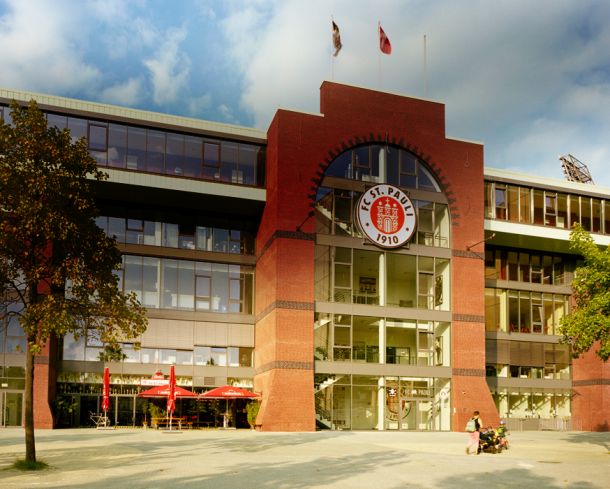What is more hipster than FC St. Pauli? Not many things, and if you are a football fan, even less. The club has an aura, a indefinable quality that makes it completely unique, not so much for it’s on-field accomplishments and history, but rather what it stands for and the fanatical fanbase. Sure, you have the historically significant Hamburger SV just around the corner, but FC St. Pauli is the prototypical Kult club; left-wing politics and all. Fans fall in love with the club as much for it’s football, and perhaps even more, for it’s identity and the sense of belonging.
FC St. Pauli really wasn’t much to write home about until about the 1980’s, when the club’s situation near the Reeperbahn, or red-light district, started working to their advantage. Previously, the area was not really conducive to attracting a dedicated fan base, with many understandably put off by the somewhat ‘alternative’ atmosphere surrounding the entire suburb. However, over time, the individuals that enjoyed this foundation of left-wing politics, social activism and hard-partying lifestyle began converging, with the club serving very much as a social hub; a spiritual home, of sorts. So the Kult grew, and St. Pauli gained more and more fame, with their connection to football hooliganism only serving to attract more like-minded fans. It is telling that in 1981, the Millerntor-Stadion averaged only 1,600 supporters, but by the late 1990’s this number had increased tenfold to the stage where 20,000 sell-outs became commonplace.
Intriguingly, FC St. Pauli had shown signs of what was to come in the 1960’s, when Guy Acolatse became the first-ever black player to play his professional football in Germany, a fact that seems to be perfectly apt for this club. Indeed, footballing icons such as Walter Frosch also plied their trade at the Millerntor-Stadion, which just builds up the legend of this Kult club even more, attracting new fans from new generations each season as they discover the stories of legend within those hallowed halls. The Skull-and-Crossbones, the unofficial emblem of FC St. Pauli, has an interesting story to it, with the most famous pirate in Germany, Klaus Störtebeker having been harbored in Hamburg, thus associating piracy, and the Skull-and-Crossbones, with the area. Another legend among fans and locals attributes the now-iconic emblem to punk-rocker Doc Mabuse, who is said to have grabbed the flag from a stall while drunk and on his way to his beloved Millerntor-Stadion.
On the pitch, the club has moved in and out of the Bundesliga, 2.Bundesliga and even the Oberliga at times, with relegation in 1984/1985 from the second division placing them in the then-third-division, before 3.Liga was brought into existence. However, the Freibeuter der Liga, or ‘Buccaneers of the League’, immediately won the Oberliga title to once again return to the 2.Bundesliga. Two very impressive seasons followed, in which FC St. Pauli became a real contender for promotion, eventually doing so in 1988, which resulted in a three year stay in the top division. Relegation and four subsequent seasons in the 2.Bundesliga followed, before another ascension in 1995 to the Bundesliga followed. Truly a yo-yo club, FC St. Pauli entered the new millennium once again in the familiar reaches of the second division. The Freibeuter der Liga truly was an enigma, regularly being too good for the 2.Bundesliga, but not quite built to make a place in the Bundesliga their own for an extended period of time. Things very much continued in this vein until 2003/2004, when the club found itself facing football in the less than glamourous reaches of the Regionaliga Nord due to financial trouble. However, where there is a will, there is a way, and the FC St. Pauli fans proved this beyond all doubt with their Retteraktion campaign, where special t-shirts with the word retter, or ‘saviour’ printed around their crest were sold to build funds, and events such as a benefit game against German giants Bayern Munich were held. This helped the club to once again reach a level of financial stability that allowed them to shine in the 2005/2006 DFB-Pokal, in which their semi-final appearance finally helped save the club from their precarious financial position. 2010/2011 saw the Freibeuter Der Liga once again reach the top flight, where an unimpressive season saw them slip back into the familiar embrace of the 2.Bundesliga, where they currently reside.
FC St. Pauli have routinely been very active in charity work, with numerous causes having been supported by the club and everyone associated with it over the years, among others projects to provide water dispensers for schools in Cuba, and accessible costless water sources in countries such as Rwanda. Supporters of the team have made somewhat of a tradition of participating in demonstrations and marches over squatting and low-income housing in and around the St. Pauli district of Hamburg. Also, gender equality is very important within the Kult, with publications such as Maxim having been removed from the Millerntor-Stadion in solidarity with their large female fanbase who disagreed with the allegedly sexist depiction of women in the magazine.
What makes FC St. Pauli even more unique is the fact that they were the first club in Germany to integrate a set of Fundamental Principles to dictate how the club should be run, also reaching beyond the borders of just football:
– "In its totality, consisting of members, staff, fans and honorary officers, St. Pauli FC is a part of the society by which it is surrounded and so is affected both directly and indirectly by social changes in the political, cultural and social spheres."
– "St. Pauli FC is conscious of the social responsibility this implies, and represents the interests of its members, staff, fans and honorary officers in matters not just restricted to the sphere of sport."
– "St. Pauli FC is the club of a particular city district, and it is to this that it owes its identity. This gives it a social and political responsibility in relation to the district and the people who live there."
– "St. Pauli FC aims to put across a certain feeling for life and symbolises sporting authenticity. This makes it possible for people to identify with the club independently of any sporting successes it may achieve. Essential features of the club that encourage this sense of identification are to be honoured, promoted and preserved."
– "Tolerance and respect in mutual human relations are important pillars of the St. Pauli philosophy."
This is very much a club unlike any other, and one can see how so many can be infatuated and intrigued the Freibeuter der Liga. Long may they continue in this unorthodox, yet enchanting way.










































